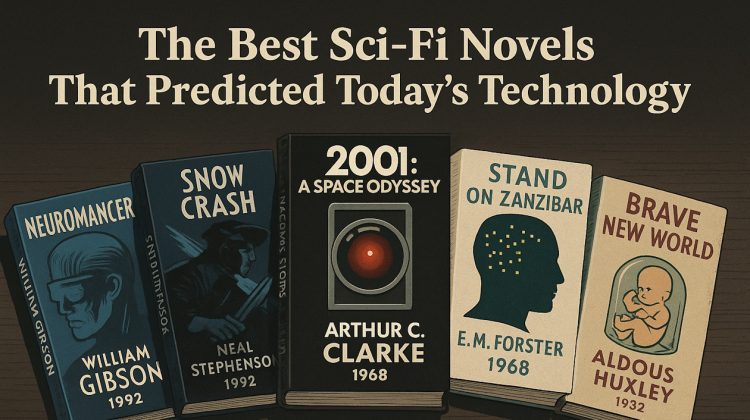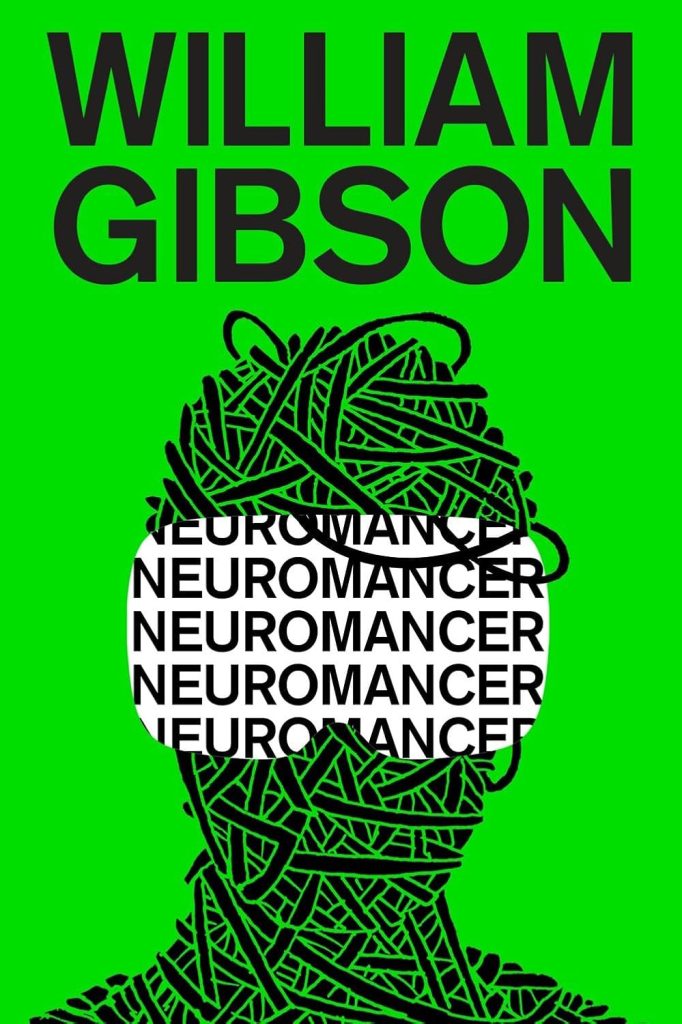
Short listicles are cute; this one’s a deep dive. Below are landmark sci‑fi novels that didn’t just entertain — they called their shots on tech we now use (or are sprinting toward). Each entry includes a brief excerpt (kept very short), the core prediction, an accuracy score (%) to real‑world tech, and where reality has already leapfrogged the fiction.
Neuromancer — William Gibson (1984)
“A consensual hallucination experienced daily by billions.”
Prediction — The Internet, cyberspace culture, and black‑hat hacking.
Accuracy: ~85%
Gibson’s “matrix” nailed the feel of living online: global networks, data theft, ICE (modern firewalls), and freelance hackers. While VR isn’t our primary interface, the social and economic gravity of the net — from digital black markets to crypto‑adjacent subcultures — is spot on.
Where we surpassed it: The smartphone as a permanent portal, cloud computing at planetary scale, and AI copilots everywhere. The gritty hacker aesthetic became… everyday life.
Snow Crash — Neal Stephenson (1992)
“In the Metaverse… your avatar can look any way you want.”
Prediction — Persistent virtual worlds, avatars, digital‑property economies.
Accuracy: ~80%
Stephenson practically branded the Metaverse before it existed. Today we’ve got VRChat, Roblox, Fortnite Creative, creator economies, and digital identity as social currency.
Where we surpassed it: Real‑time game engines on consumer hardware; spatial computing headsets; payments and creator monetization rails.
Where we’re short: Friction‑free, massively shared VR presence at scale (comfort, cost, and battery are still boss fights).
2001: A Space Odyssey — Arthur C. Clarke (1968)
“Good morning… This is HAL.”
Prediction — Conversational AI assistants, tablet‑like “newspads,” video calls, and commercial space.
Accuracy: ~75%
HAL anticipated voice‑driven, context‑aware systems (we got Alexa/Siri/Copilots — minus the paranoia… mostly). Clarke’s “newspads” look exactly like modern tablets; video calling is banal.
Where we surpassed it: Always‑connected mobile computing that’s far more personal than Clarke imagined.
Where we’re short: Robust, common‑carrier trips to the Moon and fully general, reliable AI with agency (also: let’s not HAL it up).
The Machine Stops — E. M. Forster (1909)
“The Machine… feeds us and clothes us and houses us.”
Prediction — Telepresence, on‑demand media, remote work/class, algorithmic dependence.
Accuracy: ~90%
Written before radio was mainstream, Forster predicted screen‑mediated life and social isolation via networks — eerily close to Zoom culture, streaming, and feed algorithms.
Where we surpassed it: Global bandwidth and edge devices that make “anywhere” truly viable.
Where we’re short: Total techno‑theocracy (let’s keep it that way).
Stand on Zanzibar — John Brunner (1968)
“Data‑spew” news bursts, corporate power, targeted ads, random violence.
Prediction — 24/7 info streams, algorithmic media, corporate/state surveillance.
Accuracy: ~80%
Brunner invented the “scrolling, channel‑surfing” vibe of modern feeds and the sense of living inside an analytics dashboard.
Where we surpassed it: Precision adtech, real‑time dashboards for everything, and social graphs at planetary scale.
Where we’re short: He imagined some biotech leaps earlier than reality.
The Shockwave Rider — John Brunner (1975)
“Tapeworms” that live on networks.
Prediction — Computer worms, cyberwarfare, doxxing, identity as software.
Accuracy: ~95%
Brunner described self‑propagating code disrupting institutions — decades before the Morris worm, Stuxnet, or ransomware gangs.
Where we surpassed it: Industrial‑scale cybercrime markets, botnets for rent, and nation‑state campaigns.
Brave New World — Aldous Huxley (1932)
“Ending is better than mending.”
Prediction — Reproductive tech, mood‑modulating drugs, consumerist culture engineered for compliance.
Accuracy: ~60%
IVF, embryo screening, hormonal modulation, and “cosmetic” pharmacology exist, though not Huxley’s state‑run eugenics. The consumerist dopamine loop? Uncomfortably familiar.
Where we surpassed it: Personalized medicine and bioethics frameworks; we have powerful tools without central planning (but watch the incentives).
Rainbows End — Vernor Vinge (2006)
Wearable AR, ubiquitous networking, smart textiles, crowdsourced intel.
Prediction — Everyday augmented reality and ambient computing.
Accuracy: ~70%
Vinge foresaw AR layers on everything, digital graffiti, and real‑world ARGs. We have AR glasses, pass‑through headsets, and phone‑based AR in billions of pockets.
Where we surpassed it: Edge AI on-device, privacy‑preserving compute, and creator tools for non‑coders.
Where we’re short: Lightweight, all‑day AR that people actually wear by choice.
Jurassic Park — Michael Crichton (1990)
“Life finds a way.”
Prediction — Gene editing, de‑extinction attempts, biotech commercialization.
Accuracy: ~65%
No dinos, but CRISPR‑enabled editing, de‑extinction projects (mammoth‑adjacent), DNA barcoding, and VC‑backed biotech are mainstream.
Where we surpassed it: Precision editing (CRISPR/Cas variants), gene therapies in clinic, synthetic biology toolchains.
Where we’re short: Recovering intact dinosaur genomes (we’re not that kind of miracle).
Further Reading: More Future-Thinking Brilliance From the Past
- Do Androids Dream of Electric Sheep? — Philip K. Dick (1968)
Androids, empathy, and what “human” even means in an age of convincing fakes. - Daemon — Daniel Suarez (2006)
An autonomous program re‑architects society via networks, bots, and incentives. - The Moon Is a Harsh Mistress — Robert A. Heinlein (1966)
A self‑aware computer and a networked revolution explore AI, governance, and liberty. - Earth — David Brin (1990)
Crowdsourcing, citizen journalism, and Google‑Earth‑style planetary sensing before they existed. - The Martian — Andy Weir (2011)
Maker‑mindset space survival: engineering, supply chains, and real‑world problem‑solving. - Contact — Carl Sagan (1985)
Radio astronomy, interferometry, and the politics and tech of communicating with ET. - The Circle — Dave Eggers (2013)
Surveillance capitalism with a smiley face — social scoring meets total transparency.

Leave a Reply